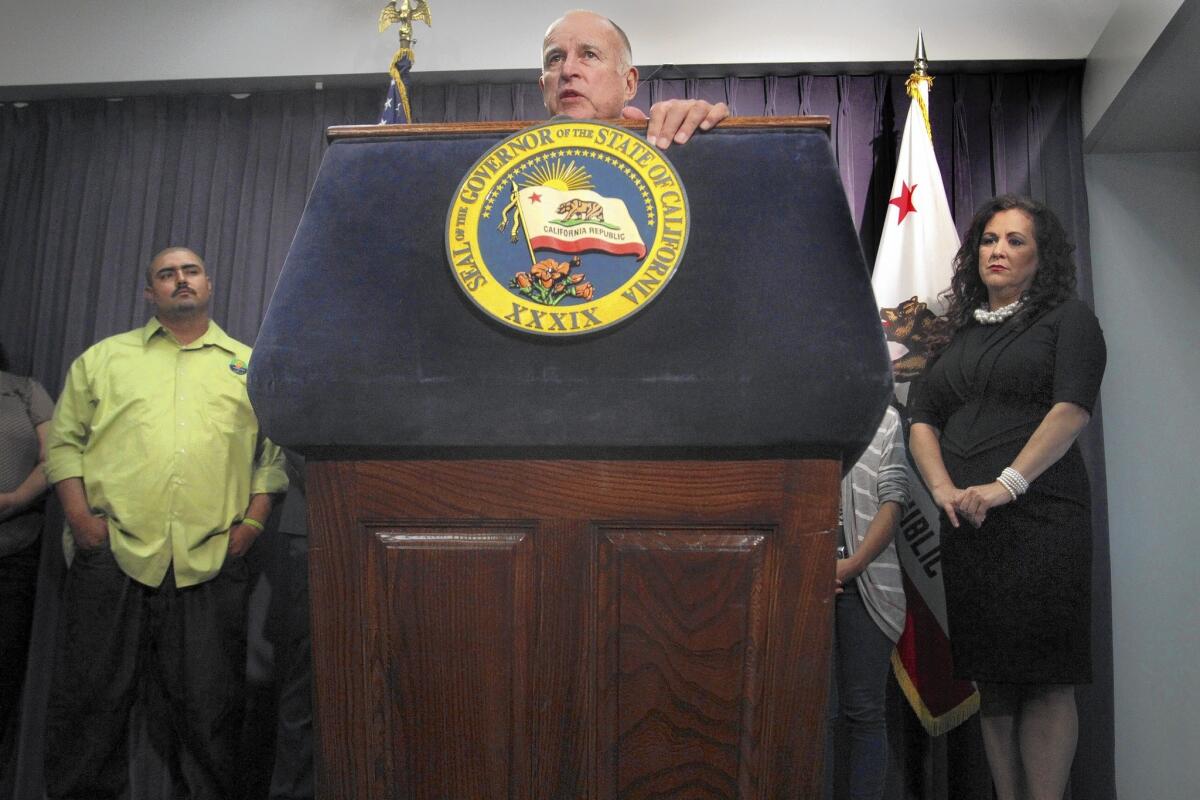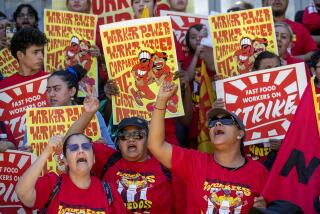Gov. Jerry Brown signs bill to require paid sick leave

- Share via
Employers in California will be required to give part and full-time workers at least three days of paid sick leave each year under a state mandate that takes effect in July 2015.
The new law, signed by Gov. Jerry Brown on Wednesday, gives workers paid sick leave at a rate of one hour for every 30 hours worked and lets them begin using the accrued time after 90 days of employment. The hours could also be used for time off to care for a sick family member.
The law, which advocates say expands paid sick leave benefits to 6.5 million workers, has been a priority for unions and workers’ rights groups for years. Business groups oppose the measure, which they say is costly to employers and could hurt hiring.
Brown, who said there was a growing inequality between workers and business owners, called the mandate “really modest.”
“When you look at the power and the wealth that is accumulated by a very small percentage, and then you look at the people at the bottom ... this is the least we can do and there’s more in the coming years,” Brown said. “This is a real step forward.”
In 2006, San Francisco County became the first county in the nation to require employers to provide paid sick leave for all employees, including temporary and part-time employees, who work within the county.
An April report by the National Partnership for Women and Families, a Washington, D.C., nonprofit that advocates for such policies, said that at least five other U.S. cities had passed laws requiring paid sick leave.
With the governor’s signature, California became only the second state to pass such a law after Connecticut approved a similar measure in 2011. Legislation has been introduced or groups are campaigning for laws to make paid sick leave mandatory in at least 20 other states.
About 40% of California’s workforce — an estimated 6.5 million people — have no paid sick leave benefits at all, according to the governor’s office. Supporters of the bill said those workers face a choice of working while ill or taking a loss of pay to care for themselves or an ill family member. They also said sick employees could infect co-workers or customers.
But business groups say workers taking time off because of an illness was never a “real issue.” Jot Condie, president and chief executive of the California Restaurants Assn. said flexible scheduling or shift swapping in the food service industry enable employees to take off when they need it without penalty. The state’s requirement adds an unnecessary expense for businesses, he said.
“Operators essentially have to pay twice — for the staffer staying home and for someone to take their place,” Condie said. “A one-size-fits-all approach to sick leave is inappropriate and onerous.”
The requirement applies to both full-time and part-time employees, but exempts workers subject to certain collective bargaining agreements and airline flight crews and attendants who are under federal labor laws. A late amendment was added to the bill to exempt state-funded in-home healthcare providers because including them would have cost the state $106 million annually.
“That’s an admission of the fact that this [law] is a burden,” said Jose Villa, a member of the National Federation of Independent Businesses California Leadership Council and president of an advertising agency in downtown Los Angeles. That burden could disproportionately affect small business in the state, he said.
John Kabateck, executive director of the independent business federation in California, said the new law would add to the cost of doing business in the state.
“Our small-business owners, who make up more than 99% of the employer community in California, already face an increase in minimum wage, among the highest taxes and more regulations than any other state,” Kabateck said. “This will only serve to eliminate any plans small employers have to grow and expand their businesses.”
Villa, whose business employs more than 40 people, said he already provides paid leave time because the market dictates it and workers expect it. But he said he’s annoyed that the state will now tell him how he should account for and credit those hours. Villa also said he was concerned that the law created a liability for business owners.
Employers would be required to display posters telling employees of their right to paid sick days and informing them that retaliation for requesting or using paid sick days is illegal. Employers could face fines of up to $4,000 per day for withholding paid sick leave or violating the bill’s requirements.
Villa said he was concerned that employees who are terminated after being sick, but for reasons unrelated to their use of sick leave, might now be able to file a wrongful termination claim alleging that they were fired in retaliation.
Not all small businesses are against the move, however. Kerry Slattery, co-owner and general manager of Skylight Books in Los Feliz, said she had been thinking about giving her part-time employees paid sick leave. Full-time workers already get three sick days, a personal day and a week or more of vacation time.
“I think it’s a reasonable thing to do,” Slattery said. “It’s investing in professional employees.”
Twitter: @chadgarland
More to Read
Inside the business of entertainment
The Wide Shot brings you news, analysis and insights on everything from streaming wars to production — and what it all means for the future.
You may occasionally receive promotional content from the Los Angeles Times.










